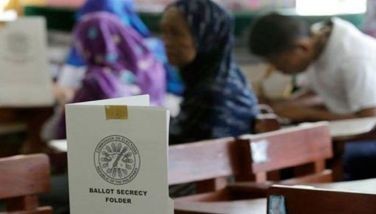5 Estrada appointees asked to quit SMC
December 17, 2001 | 12:00am
The government is requesting them to do what the Supreme Court has ruled they didn’t have to do — vacate their positions now.
Malacañang has asked the five government nominees in the 15-member board of directors of food and beverage giant San Miguel Corp. (SMC) to step down if only for the sake of propriety or delicadeza.
The nominees are Estrada’s brother-in-law Raul de Guzman, movie producer Espiridion Laxa, Hermogenes Tantoco, Allan Lee and Ben Paulino.
The five were appointed to represent the government’s stake in the company, consisting of the holdings of small coconut farmers and the Social Security System (SSS) and Government Service Insurance System (GSIS).
Presidential Spokesman Rigoberto Tiglao made the appeal yesterday as the Palace decided not to pursue any proposed compromise deal to unlock the coconut levy funds, now estimated at some P130 billion.
Tiglao said that since the Supreme Court has ordered the Sandiganbayan to come out with a final ruling on the coconut levy funds, the government is no longer inclined to pursue any compromise deal.
"Unless somebody can come up and arrange an internal interim deal within a month’s or two months’ time," the government need not pursue any compromise deal, Tiglao said.
But Tiglao stressed the nominees appointed by deposed President Joseph Estrada should heed the government’s policy in preserving the public’s holdings in the food and beverage conglomerate.
"In the first place, there must be delicadeza (propriety). They should resign because they’re not representing (Estrada) but the government and there was a change in the government," Tiglao said.
Presidential Commission on Good Government (PCGG) Commissioner Ruben Carranza said he believes the Estrada appointees are already "illegitimate" and have no legal authority to represent the government in SMC transactions and operations.
"They were never elected," Carranza said.
The government asked the Supreme Court in March to oust the five nominees but the high court allowed them to stay until the next stockholders’ meeting because the government failed to name their replacements on Jan. 20 — the day Estrada was booted from office.
Tiglao said the five appointees have since been claiming that they can only be removed via a resolution approved by stockholders.
"Their claim is that they can step down only after the stockholders’ meeting which hasn’t happened yet," he said.
The company has scheduled a special stockholders’ meeting on Feb. 27 to approve the proposed 15-percent buy-in of Japan’s Kirin Brewery Co. Ltd., which will infuse into the company some $540 million in fresh capital.
The deal was approved by the SMC board on Friday and Tiglao said Malacañang is amazed that the government nominees did not even inform the Palace of the proposal.
SMC officials have said the deal itself will enable the firm to intensify its capital expenditure program aimed at support projects, such as the planned P10-billion logistics hub, funding new acquisitions, and improving its operations.
The deal involves Kirin’s acquisition of around 443 million unissued "B" shares representing a 15-percent stake in SMC at P62 per share for a total of P27.9 billion ($540 million), apparently enough to gain two seats in the SMC board.
The shares will supposedly be issued in March next year and will result in the biggest brewery in the region as both Kirin and SMC control sizable shares of the region’s beer market.
The President had described Kirin’s buy-in as a "shot in the arm of the Philippine economy" because Kirin is a major world firm.
"What is important is that this (deal) shows we are being viewed as a very good investment area. Secondly, the government and the contending parties are both looking for solutions on how we can really help our small coconut farmers," she said.
Tiglao said that while Malacañang is fully supportive of moves that would bolster the company’s financial position, the nominees should at least have informed the government of the buy-in deal.
The government has also lauded the looming $540-million investment as a reflection of the country’s improving economic potential.
But as government representatives, the five nominees should have sought the President’s guidance on the matter.
"It seems the government appointees there should have asked their principal, which is the government, which is represented by the President, whether the government is willing to agree to that Kirin deal," he said.
Tiglao said the government has asked the five nominees to explain why they did not inform and wait for instructions from the President regarding the Kirin deal.
"It’s not that the President is against the Kirin deal but they should have informed her," Tiglao said.
Tiglao said the nominees failed to inform the Palace not only about the board meeting that approved the deal but also of the negotiations that had apparently been ongoing for months.
He stressed, however, the government will have the opportunity to question the deal when it is presented before a special stockholders meeting on Feb. 27, when stockholders may presumably exercise their legal pre-emptive rights.
"It needs the stockholders’ ratification. If we think it’s a good deal or if it’s not, we could raise some issues," Tiglao added.
Malacañang has asked the five government nominees in the 15-member board of directors of food and beverage giant San Miguel Corp. (SMC) to step down if only for the sake of propriety or delicadeza.
The nominees are Estrada’s brother-in-law Raul de Guzman, movie producer Espiridion Laxa, Hermogenes Tantoco, Allan Lee and Ben Paulino.
The five were appointed to represent the government’s stake in the company, consisting of the holdings of small coconut farmers and the Social Security System (SSS) and Government Service Insurance System (GSIS).
Presidential Spokesman Rigoberto Tiglao made the appeal yesterday as the Palace decided not to pursue any proposed compromise deal to unlock the coconut levy funds, now estimated at some P130 billion.
Tiglao said that since the Supreme Court has ordered the Sandiganbayan to come out with a final ruling on the coconut levy funds, the government is no longer inclined to pursue any compromise deal.
"Unless somebody can come up and arrange an internal interim deal within a month’s or two months’ time," the government need not pursue any compromise deal, Tiglao said.
But Tiglao stressed the nominees appointed by deposed President Joseph Estrada should heed the government’s policy in preserving the public’s holdings in the food and beverage conglomerate.
"In the first place, there must be delicadeza (propriety). They should resign because they’re not representing (Estrada) but the government and there was a change in the government," Tiglao said.
Presidential Commission on Good Government (PCGG) Commissioner Ruben Carranza said he believes the Estrada appointees are already "illegitimate" and have no legal authority to represent the government in SMC transactions and operations.
"They were never elected," Carranza said.
The government asked the Supreme Court in March to oust the five nominees but the high court allowed them to stay until the next stockholders’ meeting because the government failed to name their replacements on Jan. 20 — the day Estrada was booted from office.
Tiglao said the five appointees have since been claiming that they can only be removed via a resolution approved by stockholders.
"Their claim is that they can step down only after the stockholders’ meeting which hasn’t happened yet," he said.
The company has scheduled a special stockholders’ meeting on Feb. 27 to approve the proposed 15-percent buy-in of Japan’s Kirin Brewery Co. Ltd., which will infuse into the company some $540 million in fresh capital.
The deal was approved by the SMC board on Friday and Tiglao said Malacañang is amazed that the government nominees did not even inform the Palace of the proposal.
SMC officials have said the deal itself will enable the firm to intensify its capital expenditure program aimed at support projects, such as the planned P10-billion logistics hub, funding new acquisitions, and improving its operations.
The deal involves Kirin’s acquisition of around 443 million unissued "B" shares representing a 15-percent stake in SMC at P62 per share for a total of P27.9 billion ($540 million), apparently enough to gain two seats in the SMC board.
The shares will supposedly be issued in March next year and will result in the biggest brewery in the region as both Kirin and SMC control sizable shares of the region’s beer market.
The President had described Kirin’s buy-in as a "shot in the arm of the Philippine economy" because Kirin is a major world firm.
"What is important is that this (deal) shows we are being viewed as a very good investment area. Secondly, the government and the contending parties are both looking for solutions on how we can really help our small coconut farmers," she said.
Tiglao said that while Malacañang is fully supportive of moves that would bolster the company’s financial position, the nominees should at least have informed the government of the buy-in deal.
The government has also lauded the looming $540-million investment as a reflection of the country’s improving economic potential.
But as government representatives, the five nominees should have sought the President’s guidance on the matter.
"It seems the government appointees there should have asked their principal, which is the government, which is represented by the President, whether the government is willing to agree to that Kirin deal," he said.
Tiglao said the government has asked the five nominees to explain why they did not inform and wait for instructions from the President regarding the Kirin deal.
"It’s not that the President is against the Kirin deal but they should have informed her," Tiglao said.
Tiglao said the nominees failed to inform the Palace not only about the board meeting that approved the deal but also of the negotiations that had apparently been ongoing for months.
He stressed, however, the government will have the opportunity to question the deal when it is presented before a special stockholders meeting on Feb. 27, when stockholders may presumably exercise their legal pre-emptive rights.
"It needs the stockholders’ ratification. If we think it’s a good deal or if it’s not, we could raise some issues," Tiglao added.
BrandSpace Articles
<
>
- Latest
- Trending
Trending
Latest
Trending
Latest
Recommended
































